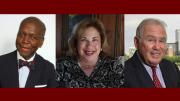The Harvard Alumni Association today recognized three individuals as the 2020 Harvard Medalists, honoring their extraordinary service to the University. (The actual medal presentation, typically part of the HAA’s annual meeting on Commencement Day, has been deferred to a later date.)
Senior College admissions officer David L. Evans retires this summer, following more than five decades of service through which he recruited a widely diverse group of students from across the country, and became a mentor, advocate, and friend for many undergraduates. Originally from Arkansas, Evans earned degrees in electrical engineering from Tennessee State University and Princeton, and in the 1960s, while working on the Saturn-Apollo project in Alabama, he began recruiting African-American high-school students for admittance to some of the nation’s top universities. Evans has advised the Harvard Foundation for Intercultural and Race Relations since 1981, and in 2003, the David L. Evans Scholarship Fund was established for students from underrepresented backgrounds. In addition, The Hutchins Center for African & African American Research awarded him the W.E.B. Dubois Medal in 2016.
Leila T. Fawaz, A.M. ’72, Ph.D. ’79, was a member of the Board of Overseers from 1996 to 2012—including a term as president; she also served as an Overseer member of the Harvard Alumni Association Committee to Nominate Overseers and Elected Directors (from 2009 to 2016). In 2014, she received a Lifetime Achievement Award from the Harvard Arab Alumni Association, honoring “distinctive achievements in promoting cultural, scientific, social, economic, or political development in the Arab region.” Born in Sudan to Greek-Orthodox Lebanese parents and raised in Lebanon, Fawaz is the Fares professor of Lebanese and Eastern Mediterranean studies at Tufts. In 2012, she was named a Chevalier in the French National Order of the Legion of Honour.
Joseph J. O’Donnell ’67, M.B.A. ’71, has held numerous roles at Harvard over a long tenure, including as a member of the Harvard Corporation and the Board of Overseers, and elected director of the HAA. In 2013, he was tapped to co-chair the Harvard Campaign. In addition, he has served on the Allston Work Team and the Harvard College Fund executive committee, and chaired many College and Harvard Business School (HBS) reunions. O’Donnell has also dedicated his philanthropic efforts to cystic fibrosis research, establishing the Joey Fund in 1986 after losing his own son, Joey, to the disease. Raised in the blue-collar city of Everett, Massachusetts, O’Donnell attended Harvard on a full scholarship, excelling in football and baseball; he later endowed the baseball-coach position and funded O’Donnell Field. He currently chairs a nationwide leader in the food service industry.









